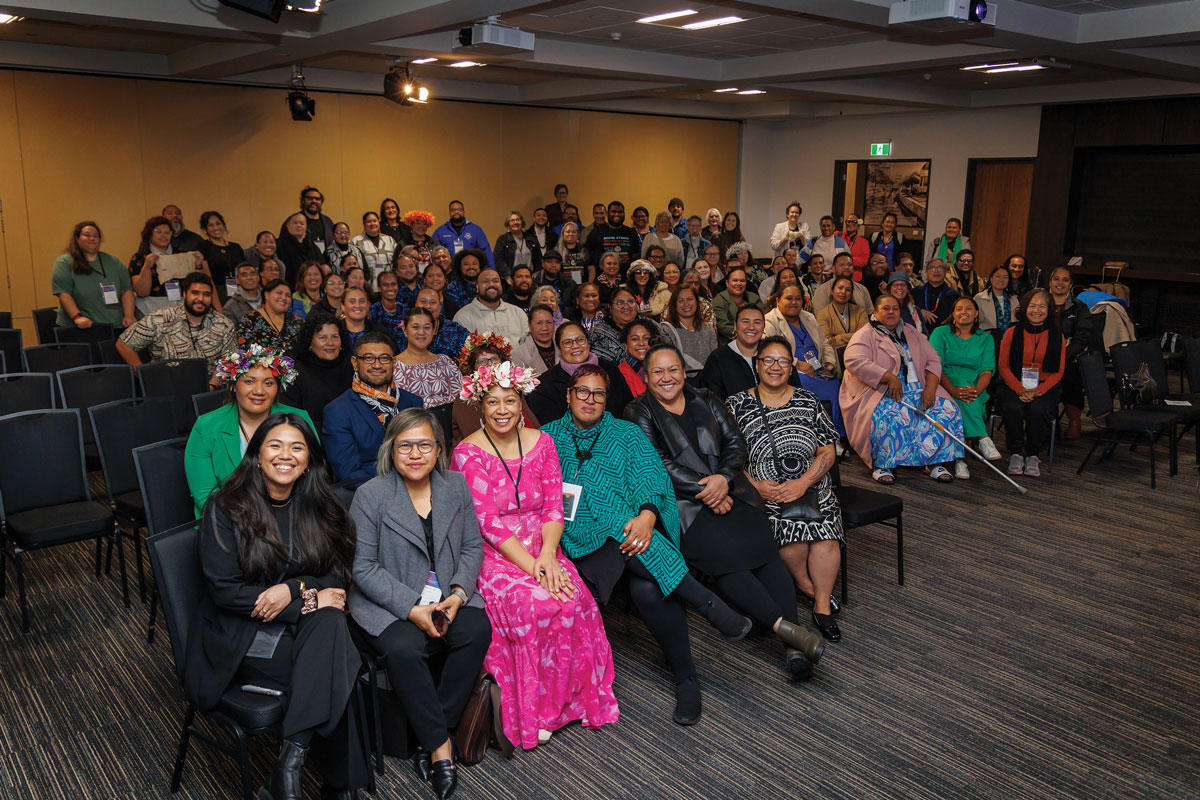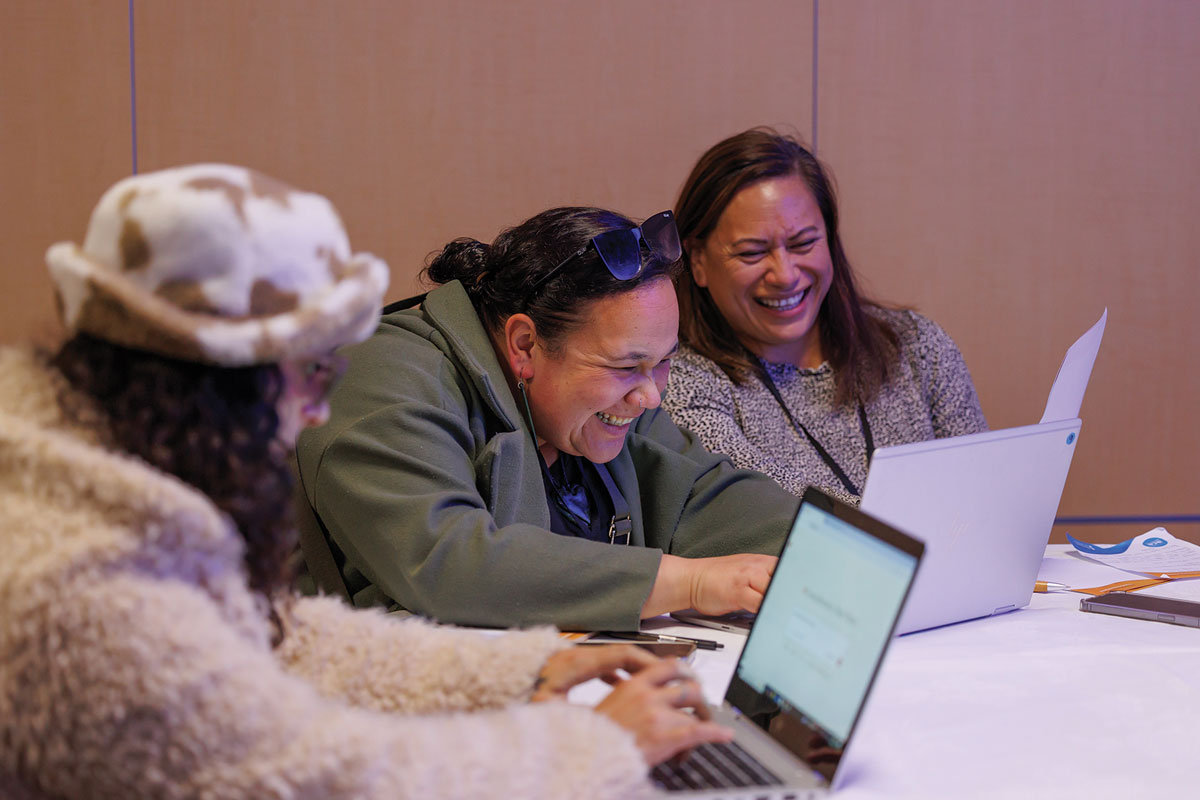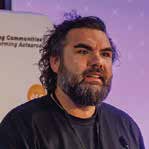
Since its inception in 2008, Hui Fono has been a uniquely Māori and Pacific-led space for professional development, intentionally grounded in indigenous knowledge systems and pedagogies.
It is a conference experience that is authentic and honouring of Tangata Whenua and Tangata Te Moana-nuia-Kiwa (people of the Pacific).
This year marked several firsts: the first time Hui Fono was held in a hotel, the first time it ran for one day only, and the first-ever use of a digital app to support real-time interaction.
 In its 15th year, Hui Fono 2025 had more than 130 participants, with more than half continuing on to attend the ACE Conference.
In its 15th year, Hui Fono 2025 had more than 130 participants, with more than half continuing on to attend the ACE Conference.
Former ACE Aotearoa Director Analiese Robertson returned as Hui Fono and Conference Director to manage this change in strategic direction for the two flagship events, bringing her deep knowledge of the sector and the vision to life.
“The bringing together of many ancestors into one space requires significant care and an intelligence of its own,” she said.
“There is high expectation with representation, ceremonies, ‘un-conferencing’, while being strictly anchored in the AI – ancestral intelligence that is commonly characteristic of the described learning services delivered by Māori and Pacific.”
Keynote: The Power of Storying from the Homeland
 The event opened with a powerful keynote from Papali’i Pale Sauni, affectionately known as Pale in the Fale.
The event opened with a powerful keynote from Papali’i Pale Sauni, affectionately known as Pale in the Fale.
A long-serving educator and Papali’i of Savai’i, Samoa, Pale traced his personal journey from heritage land to leadership in Aotearoa’s education, health and social service sectors.
He shared an impactful presentation of his ancestral lands in Samoa, acknowledged his mother’s journey of migration, and how that landed him as a leader in education, health and social services.
Pale spoke about ancestral intelligence through the lens of his own family and contrasted his upbringing in Sāmoa, fluency in the language and his immersion in the culture, with his son’s experience of being born in Aotearoa New Zealand and now on a journey of reconnection.
A key point that ancestral intelligence resonates with our ancestors’ traditional knowledge we want to retain.
Panel: Culture, Technology and Intergenerational Wisdom
A rich panel discussion brought together voices from academia, tech and the arts.
Dr Linita Manu’atu introduced the Tongan concept of poto (spiritual insight and wisdom) as a counterpoint to the limitations of modern AI.
She was joined by technologist and founder of Tokelau in Tech and Inati AI, Tracey Savelio, artist and cultural leader Nina Oberg Humphries and product consultant Norie Ape.
Their conversation examined what it means to pass down knowledge, not just through data, but through lived connection and intergenerational storytelling.
Ako Session Workshop Highlight: Will Fleming’s DigiKōr and the Future of Oral Storytelling
 Will Fleming, founder of Campfire Studios, is dyslexic. But that hasn’t stopped him from becoming an extraordinary storyteller.
Will Fleming, founder of Campfire Studios, is dyslexic. But that hasn’t stopped him from becoming an extraordinary storyteller.
With the help of AI, the Cook Islands-born video director and podcast producer has built a platform for authentic Māori and Pasifika storytelling.
Through Campfire Studios, Will captures and preserves intergenerational kōrero to help whānau reconnect with their heritage using digital tools.
His mission is to elevate Māori and Pasifika voices and protect oral traditions for future generations.
At Hui Fono, Will introduced DigiKōrero, an NZQA-accredited programme that teaches participants how to use podcasting and digital media to share their stories.
It’s a space for talanoa and for learning how to record, store and honour the knowledge passed down through whānau.
Will says he only sees positive in AI. “Each story I record is essentially data and AI takes that data and helps analyse and frame it. It only hallucinates or does its own thing when there is not enough context provided.
“With the work I do, whānau provide the context and history. Imagine two generations from now, your stories and your parent’s stories are still alive and thriving because they have been captured and stored.”
Profile: Tracey Savelio – Bringing Inati to the Cloud
 Inati is a traditional Tokelauan practice built on the principle of fair and equal sharing.
Inati is a traditional Tokelauan practice built on the principle of fair and equal sharing.
When fish are caught, the community ensures that every household receives a portion, based on family size. It’s a cultural expression of unity, support and equity.
This value system has become the foundation of Tracey Savelio’s work in technology. As a result, she created Inati AI, a project grounded in her Tokelauan values of equity.
By day, Tracey works as a data governance analyst at Kiwibank. But her influence reaches far beyond her day job.
She actively volunteers her time and expertise to support digital inclusion and innovation in Pacific communities.
Last Easter, she launched the Tokelau in Tech social media platforms to make technology more accessible.
These platforms, which are all tailored for the Pacific community, provide free resources, links to IT tools and a central hub of AI knowledge.
Tracey also founded Katou Connect, an online training initiative delivering digital literacy programmes such as Internet Basics, Online Safety and introductory AI courses.
Inside Kiwibank, Tracey has become a driving force for women in tech.
She completed an external Amazon Web Services (AWS) “Cloud for Her” course, a flexible learning pathway for women globally who want to go deeper on the AWS Cloud system.
After lobbying for the programme to be brought in-house, Kiwibank became the first organisation to offer the AWS “CloudUp for Her” programme internally.
As a mentor in the eight-week course, Tracey supports women across the bank in building confidence and technical skills, guiding them toward AWS Cloud Practitioner certification.
“I’m especially passionate about increasing Māori and Pasifika representation in tech and creating pathways for women to thrive in this space,” Tracey said.
“We must make IT accessible and integrate culture with protection. We are the data stewards of our community – and that is a large responsibility.”
Reflections from the Wānanga | Talanoa Sessions
Attendees shared their intelligence, with prompting from our reflection cards. Here’s a selection of their voices:
How can AI tools be designed to reflect the tikanga, languages and worldviews of our communities?
- “Distribution of knowledge through AI can be a powerful tool – creating an environment where practices are adhered too.”
- “It needs human knowledge and ideas to feed into this tool. People need to be upskilled so they can comfortably feed into the system”
- “By having indigenous voices at the helm. Have our own tools. Use our language. Named by us.”
What might a co-created learning resource look like in your community? Who needs to be involved?
- “It’s accessible, relevant and easy to use and provides accurate information.”
- “Community is a very broad term. There needs to be a model created that each community can adapt to reflect the needs and requirements of the community. It requires lots of talanoa that are frequent.”
Where might AI create harm, exclusion or imbalance in your learning context — and how can we prevent this?
- “Potential imbalances and harm can occur with misuse of AI and creating unedited or unreferenced information to be shared creating a false platform made up by AI to gap fill enquiries.”
- “I think knowledge is power so releasing any knowledge, cultural or native will create imbalance. To some extent it is a way of colonisation so it does impose serious implications if terms and conditions aren’t read properly.”
- “Provide training. Read terms and conditions. Perform regular audits. Protect privacy.”
In Their Own Words: Participant Reflections
After the event, attendees were invited to reflect on the kaupapa, the kōrero, and what they would carry forward into their own work and communities.
Here’s what some of them shared:
- “Seeing our own phenomenal people of Māori and Pasifik in the AI, data, tech and academic world share their knowledge with such passion and generosity. Whilst a small number of our own [are] trailblazing the way, they are now part of our Hui Fono family that we can connect with, collaborate alongside and seek their esteemed counsel.”
- “The kōrero about Ancestral and Artificial Intelligence and understanding their individual roles as an individual. But then being able to apply that same understanding to my organisation and bridging that gap of using artificial intelligence as a tool to improve efficiency, while understanding that you still have to use your ‘ancestral intelligence’ to ensure the essence of the organisation, e.g. kaupapa and values, are reflected in the artificial intelligence output. An example could be using artificial intelligence to write a policy; this will give you a first draft. But then using your ‘ancestral intelligence’ from an organisation perspective to refine the policy to align with the organisation’s Kaupapa, values and beliefs while reflecting on its history, too.”
- “I always love building my networks. Finding out what everyone is up to in their space and having those conversations where we cut out the barriers that we face in our workshop and [we] can sit down and say... Okay the stats are still not good for us as Māori and Pasifika but what can we do about it? What are you doing about it? How can we continue to work together? I would love for us to continue in the Ancestral Intelligence within the tech space as that really is the best pathway for us to continue to advance both the ancestral and artificial knowledge systems. And have better outcomes for our people.”
These reflections speak to the depth of connection, the relevance of the conversations, and the value of creating a space where ancestral knowledge and digital tools can coexist.
From ancestral lands to digital landscapes, Hui Fono 2025 showed how deeply rooted cultural intelligence continues to shape the future of learning, leadership and technology.
